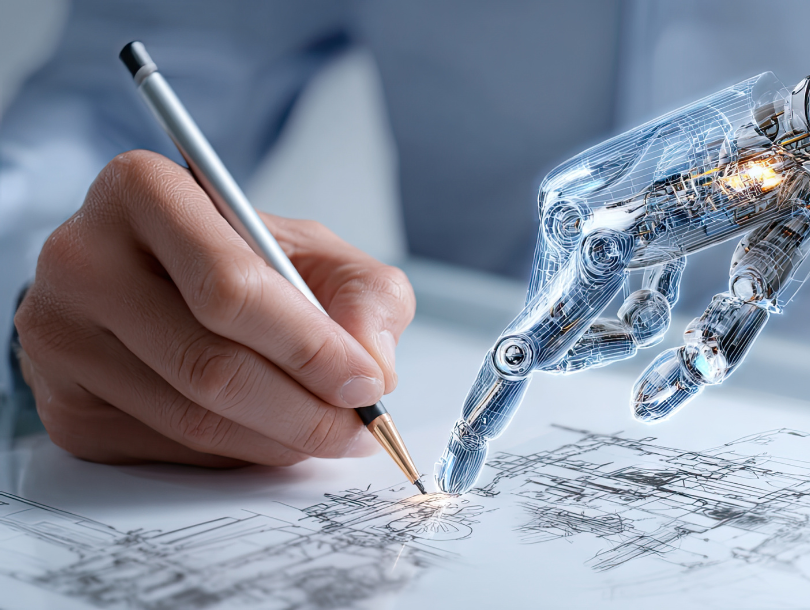In the dynamic world of construction, where the stakes are high and the margins often thin, professionals are constantly on the lookout for innovative ways to gain a competitive edge. Enter Artificial Intelligence (AI) – the buzzword that's not just reshaping industries across the board but also showing promising potential in construction. Outside construction huge savings are already being demonstrated at scale, the international bank Klarna recently announced that it had saved $40 million dollars via automating customer service with AI. But how exactly is AI carving out a niche in this age-old industry, and more importantly, can it really give you an edge over your competitors? Let's dig into the nitty-gritty of AI in construction and find out.
First, let's look at how we're using AI in Construction today
The construction industry, with its complex project dynamics and high demand for precision, has always been a fertile ground for innovation. Recently, AI has emerged as a game-changer, offering solutions that were once considered futuristic.
Predictive Analytics
Predictive analytics is the science of examining real world observed data and using algorithms to forecast future project events, whether these be project cost overruns, constructability issues, and structural stability. AI applications using predictive analytics serve as a crystal ball, providing insights during critical decision-making phases. Startups like Alice technologies, NPlan and Nodes & Links are capable of analysing existing plans to predict future project events and provide early warnings of trouble ahead.
Robotics and Automated Surveying
The use of robotics and drones in construction isn't just about cool tech. It's about precision, efficiency, and safety. Drones are being deployed on construction sites around the world by startups like Dart Drones, Wingtra and Exyn Technologies to automate the surveying and defect detection of structures, often with real time connection back to the project BIM model, streamlining data collection back to a single source of truth.
AI in Project and Subcontract Management
The backbone of any successful construction project is efficient project and subcontract management. Startups like Civils.ai have developed tools to reduce rework and design errors on construction projects by detecting changes to project documents and automatically coordinating updates, avoiding potential rework issues.
Supply Chain Optimization
Remember the last time project timelines were disrupted due to material shortages? AI's supply chain optimization is here to change that narrative. By employing supervised learning techniques, such as gradient-boosting trees, AI streamlines materials and inventory management, ensuring everything is just where it needs to be, when it needs to be there.
Image Recognition for Safety Management
Using machine learning for image recognition, construction sites are now safer places. Drone imagery and 3-D models are analyzed for quality control, defect detection, and safety risk identification, making the job site a less hazardous environment.
But can these applications give us a competitive edge?
The integration of AI into construction processes is not just about adopting new technologies; it's about redefining operational efficiency and project management. From expediting contract reviews with AI-driven analysis tools to enhancing job site productivity with autonomous machinery, AI offers a significant competitive advantage.
Case Study 1 - Predictive analytics on construction sequences
Utilizing ALICE Technologies, the SCS JV (Skanska, Costain, STRABAG joint venture) was able to optimize production rates and improve project efficiency on the high-speed rail Copthall Green Tunnels part of HS2. This approach enabled them to generate more than three months of float on their project schedule, demonstrating a significant improvement in efficiency and time management for a complex infrastructure project.
Case Study 2 - Automatic drone surveys with defect detection
Drones dramatically reduce surveying time, according to data from Wingtra using their drones cut a 100-hour task for surveying a 12-acre property to just about 2 hours. This 98% reduction in time translates into significant labor savings and efficiency improvements.
Case Study 3 - Automated document management
Civils.ai automated document manager eliminates rework and design errors on construction projects have demonstrated savings of 1-2 hours of staff time per day alongside a boost of 10% to submission quality and staff morale whilst working with clients such as ARUP, AECOM and Arcadis.
What is holding us back from unlocking more value?
Despite the promising prospects, integrating AI into construction comes with its set of challenges. From the high costs often associated with developing AI technologies and the need for specialized talent developing such applications, the road to AI integration is paved with obstacles. Moreover, companies must tackle data privacy concerns and ensure the reliability and accuracy of AI systems.
The Road Ahead
The future of AI in construction is bright, with promises of further automation, enhanced safety, and increased efficiency. To stay ahead, companies must embrace continuous learning, invest in AI research and development, and foster a culture open to innovation. Collaborating with AI technology providers and academia can accelerate AI adoption and pave the way for a future where AI-driven innovations are integral to construction processes.
As we stand on the brink of a new era in construction, one thing is clear: the integration of AI holds the key to unlocking unprecedented competitive advantages. By embracing AI, construction professionals can not only navigate the challenges of today but also pave the way for a more efficient, safer, and innovative future.
The question is no longer if AI can give you an edge over the competition but how quickly you can integrate these technologies to redefine the landscape of construction. The future is here, and it's powered by AI.
 Julianna Xoe Widlund, PE
Julianna Xoe Widlund, PE
